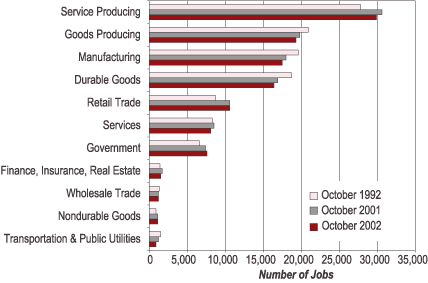Kokomo
Center for Economic Education, Indiana University, Kokomo
Kokomo's economy is heavily weighted toward manufacturing. Employment in manufacturing industries peaked statewide in June 2000. While recent losses have been much less than before and some months have even posted gains, employment is still not anywhere close to its peak. Many firms in the Kokomo area are still seeing a slow business climate and general economic malaise (see Figure 1). This hits especially hard since Kokomo has been one of the economic powerhouses of the area. The Kokomo Metropolitan Statistical Area (MSA) has long had the distinction of being one of the top MSAs in the country in terms of average salary, despite being the smallest of the eleven MSAs in Indiana. Nationwide, the economy has been somewhat sputtering, as consumers worry about things, such as a possible war or layoffs. The situation with Iraq remains volatile, and the effects of a war on the economy are difficult to predict for many reasons, including the length of the war, the involvement of other nations in the fighting, and the number of U.S. reserve troops activated.
Figure 1
Kokomo MSA Employment by Industry

On the local front, the moves by the Fed to lower interest rates (and keep them low) have allowed automobile manufacturers to offer zero percent financing. This has protected jobs and production at the DaimlerChrysler plants, which are an important part of the local economy. In addition, low interest rates have led to increases in home sales, refinancing, and borrowing for home improvements. Consumer spending has been the true engine of the economy in the recent past and is likely to continue to be so in the future. But as interest rates rise, as they are likely to do, consumer spending will be pinched somewhat.
There have been some specific signs that the economy, while not growing gangbusters, has at least held its own in Kokomo. Unemployment has increased from the September 2000 levels of 2.7 percent to September 2001 levels of 5.4 percent. The average work week has increased, meaning more overtime pay. Last year at this time, the average weekly earnings had fallen to $996, but these earnings have regained ground and are now at $1,251.
Prospects for the Future
Kokomo remains highly dependent on the automobile industry. The zero percent financing has worked very well and enticed many to purchase a new vehicle. These special financing deals may have taken care of pent-up demand for vehicles, so the zero percent financing may fail to entice as many new sales. DaimlerChrysler has been doing better in meeting analysts' forecasts for sales and profits. But the company still has a ways to go in their cost cutting measures. This will presumably pressure the local economy as the company cuts wage and benefit packages.
In summary, the Kokomo economy, like much of the rest of the country, is in a holding pattern. Small business owners report that their business is just doing okay and most are in a wait-and-see mode for the future.
Also in this Issue…
- Outlook for 2003
- The U.S. Economy
- The International Economy
- Financial Forecast
- Housing
- Indiana
- Anderson
- Bloomington
- Columbus
- Evansville
- Fort Wayne
- Gary
- Indianapolis
- Kokomo
- Lafayette
- Muncie
- New Albany
- Richmond
- South Bend/Mishawaka and Elkhart/Goshen
- Outlook Summary for 2003
- Return to Table of Contents



